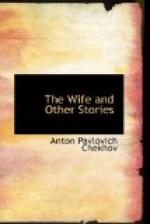“A month later Byelikov died. We all went to his funeral—that is, both the high-schools and the seminary. Now when he was lying in his coffin his expression was mild, agreeable, even cheerful, as though he were glad that he had at last been put into a case which he would never leave again. Yes, he had attained his ideal! And, as though in his honour, it was dull, rainy weather on the day of his funeral, and we all wore goloshes and took our umbrellas. Varinka, too, was at the funeral, and when the coffin was lowered into the grave she burst into tears. I have noticed that Little Russian women are always laughing or crying—no intermediate mood.
“One must confess that to bury people like Byelikov is a great pleasure. As we were returning from the cemetery we wore discreet Lenten faces; no one wanted to display this feeling of pleasure—a feeling like that we had experienced long, long ago as children when our elders had gone out and we ran about the garden for an hour or two, enjoying complete freedom. Ah, freedom, freedom! The merest hint, the faintest hope of its possibility gives wings to the soul, does it not?
“We returned from the cemetery in a good humour. But not more than a week had passed before life went on as in the past, as gloomy, oppressive, and senseless—a life not forbidden by government prohibition, but not fully permitted, either: it was no better. And, indeed, though we had buried Byelikov, how many such men in cases were left, how many more of them there will be!”
“That’s just how it is,” said Ivan Ivanovitch and he lighted his pipe.
“How many more of them there will be!” repeated Burkin.
The schoolmaster came out of the barn. He was a short, stout man, completely bald, with a black beard down to his waist. The two dogs came out with him.
“What a moon!” he said, looking upwards.
It was midnight. On the right could be seen the whole village, a long street stretching far away for four miles. All was buried in deep silent slumber; not a movement, not a sound; one could hardly believe that nature could be so still. When on a moonlight night you see a broad village street, with its cottages, haystacks, and slumbering willows, a feeling of calm comes over the soul; in this peace, wrapped away from care, toil, and sorrow in the darkness of night, it is mild, melancholy, beautiful, and it seems as though the stars look down upon it kindly and with tenderness, and as though there were no evil on earth and all were well. On the left the open country began from the end of the village; it could be seen stretching far away to the horizon, and there was no movement, no sound in that whole expanse bathed in moonlight.
“Yes, that is just how it is,” repeated Ivan Ivanovitch; “and isn’t our living in town, airless and crowded, our writing useless papers, our playing vint—isn’t that all a sort of case for us? And our spending our whole lives among trivial, fussy men and silly, idle women, our talking and our listening to all sorts of nonsense—isn’t that a case for us, too? If you like, I will tell you a very edifying story.”




